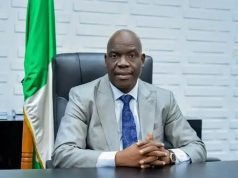By Philip Agbese
This is the era of reawakening in Nigeria. The youths have clamored for a generational shift in the country’s governance. The agitation is genuine, and most political parties have systematically keyed into this reawakening. The slogan is rife. The people are prepared, and the manifestation is now.
However, a silent achiever has been in the background, working tirelessly to make a difference in governance. This youthful prodigy is quiet and, most times, camera-shy. He prefers to be under the radar most times as the important thing for him is getting the job done in a manner that speaks creativity and the outside-the-box approach.
Enter the world of Ahmad Salihijo Ahmad, the Chief Executive Officer of the Rural Electrification Agency (REA). Ahmad Salihijo was appointed in 2019 by President Muhammadu Buhari to bring his wealth of experience in the private sector to bear in the Rural Electrification Agency.
The REA was established to increase electricity access to rural and under-served clusters nationwide by developing off-grid electrification strategies. And Ahamd Salihijo came in handy as a renewable energy expert with two master’s degrees in development studies and project planning.
Since coming on board in 2019, it has been a tale of success stories at the REA. He proved that age was a number and hit the ground running with policies and programs that relate to achieving the strategic mandate of the agency. This much was corroborated by industry stakeholders commending his leadership style and unalloyed commitment towards the agency’s objectives.
For example, one of the ways he has been able to address the myriads of challenges in rural electrification across the country was through the entrenchment of transparency and accountability in the affairs of the agency. This was a critical move considering the circumstances that led to the ouster of the previous administration of the agency.
Ahmad upon assumption of office, instituted a code of conduct that emphasized commitment and dedication in an atmosphere of transparency and accountability. This strategy paid off as all avenues for cutting corners were effectively addressed.
For example, in the last few years, the agency has strengthened its engagements with private sector developers and other key stakeholders to deploy off-grid technologies for electrification, especially for productive use and socio-economic impact in off-grid communities.
According to the youthful CEO, agriculture is one of the key areas looked at. He says, “We understand that once you provide power in agriculture, you naturally empower people to go into farming, enhancing their livelihoods. This is why beyond providing power in off-grid communities, we equally dedicate time and resources towards the productive use of energy (PUE).”
This strategy paid off with $20 million in support from the African Development Bank to invest in productive-use equipment and models in off-grid communities under the Nigeria Electrification Project (NEP) framework.
Under his watch, the REA agency is implementing the Energizing Agriculture Programme (EAP) designed to boost GDP, accelerate renewable energy use and unlock agricultural productivity in Nigeria. The EAP is a 3-year initiative activated in 2022 with support from the Rocky Mountain Institute (RMI), the Global Energy Alliance on People and Planet (GEAPP), and the Rockefeller Foundation, designed to enable market-led solutions while breaking the silos separating electrification and agricultural development.
An excellent example of the successes recorded under this initiative is the Olooji community, Ogun State, where a 100kWp solar hybrid mini-grid was installed. Olooji is a community that has existed for about 200 years but received energy infrastructure for the first time in 2021 through REA’s intervention.
Under the Energizing Education Programme (EEP), REA has completed projects in seven universities. The World Bank and the African Development Bank have equally committed to funding phases II and III of the EEP, respectively. These didn’t happen overnight. We must agree that it was a function of the demonstration of leadership by the REA under the watch of Ahmad Salihijo Ahmad.
The country needs leadership to address its socio-economic challenges, and Ahmed has provided us with an excellent example of that leadership model that public officeholders should emulate.
Those in contact with him would attest that he is a very passionate individual who has demonstrated capacity and competence in discharging his duties. He has successfully changed the narrative that the youths are unprepared for leadership.
Little wonder that the REA delivered over 95% of the NEP impact between 2020 and 2022. The NEP-SHS component is one of the fastest-growing components being implemented by the agency. These projects have also catalyzed socio-economic activities across the beneficiary communities. The NEP program, now an exemplary off-grid model in sub-Saharan Africa, has achieved about 6.7 million connections, impacting nearly 10 million Nigerians in rural communities nationwide.
The commendations have been in good supply. Industry stakeholders have described him as a messiah who, through hard work, has improved access to electricity in rural areas. He was able to dismantle the obstacles holding rural electrification across the country. Some in the know of the operations of the REA hinted that the Managing Director has consistently emphasized transparency and accountability since coming on board.
There are many lessons to learn from the leadership strides of this pathfinder. One is that the youths are ready for leadership, and two is that there will always be a way once there is a will. Ahmad Salihijo has demonstrated renewed hope for youths in the country. He is a trailblazer and no doubt a lesson in leadership. This is a thumbs up for the youths. I salute his courage and consistency.
Agbese is a member-elect, Federal House of Representatives and wrote this piece from Abuja.








